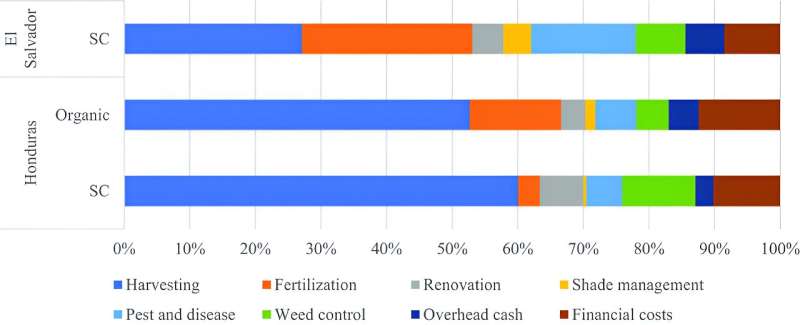This article has been reviewed according to Science X's editorial process and policies. Editors have highlighted the following attributes while ensuring the content's credibility:
fact-checked
peer-reviewed publication
trusted source
proofread
Analyzing cost and profitability of specialty coffee in Central America

In Honduras and El Salvador, coffee (Coffea arabica) is one of the leading agricultural exports, and the share of specialty coffee is growing each year. However, despite the importance of specialty coffee production and exports, there is a knowledge gap regarding its cost structure and profitability, particularly those associated with labor costs
The global market for specialty coffee (Coffea arabica) has increased significantly in the past several years. The increase in the demand for specialty coffee has generated significant interest among coffee farmers in producing countries. In the case of Honduras, the registration of specialty coffee began during the 2009 to 2010 harvest. By the 2019 to 2020 harvest season, specialty coffee accounted for 54% of total exports. In El Salvador, ≈80% of coffee exports are now differentiated/specialty coffee.
Several studies have evaluated the costs and profitability of coffee production in the region. However, most have focused on coffee production in Honduras, whereas studies in El Salvador are less common. Moreover, most of the studies have focused on conventional coffee production.
This study contributes to this literature by estimating and comparing specialty coffee production costs and profitability in Honduras and El Salvador using data collected from interviews with farmers. The approach also provided a comprehensive assessment of all the expenses involved in coffee production.
The specific objectives of the study were to determine the cost structure of specialty coffee in Honduras and El Salvador and to estimate the costs and profitability of producing specialty coffee in these countries. A semi-structured survey instrument was administered to 14 farmers in Honduras and El Salvador selected as a convenience sample to represent different farm sizes, regions, and specialty-conventional and organic production systems.
The results showed that, although both countries are neighbors and economically and culturally similar, the cost structure of producing specialty coffee differed significantly.
The information generated in this study can be helpful to potential and current producers. Individuals planning to enter into coffee production can use the results as a guide for their decisions, whereas current producers can benchmark their operations.
The findings of this study may also be of interest to other actors in the coffee supply chain (e.g., buyers, processors, governments, and consumers), who are increasingly voicing concerns about the economic sustainability of the coffee business. These concerns include long-term financial viability of farm operations.
In summary, except for the estimated cost of production of organic coffee in Honduras, which was significantly lower than that of a previous study, other cost estimates were within the range of values reported previously.
Carlos Carpio and Luis Sandoval have studied the economics of coffee for several years. Coffee research has primarily focused on the technical aspects of the industry, specifically at the production and processing stages, with minimal research being conducted on the consumers' side and social aspects.
Therefore, their research aims to improve our understanding of the sector from an economic and socially sustainable perspective. Because of the economic and social importance of the crop to the region, they expect to continue conducting valuable research that contributes to the industry's sustainability.
The paper is published in the journal HortTechnology.
More information: Carlos E. Carpio et al, Cost and Profitability Analysis of Producing Specialty Coffee in El Salvador and Honduras, HortTechnology (2022). DOI: 10.21273/HORTTECH05028-22
Journal information: HortTechnology
Provided by American Society for Horticultural Science




















